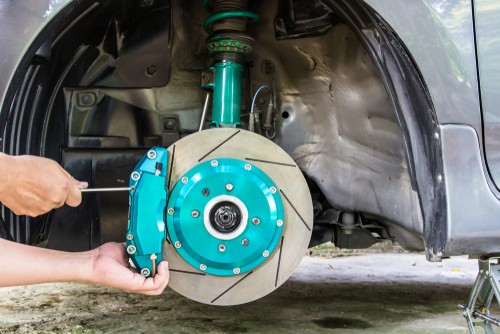Demystifying brake pads and the role they play in keeping you safe on the road.
Millsboro Pond Fishing and Boating area is a great place to demystify the mystery of catching the perfect fish; solving these mysteries can be fun. But, some mysteries take a little input from friends. And, your friends at In and Out Tire Pros are here to help demystify the mystery of brake pads.
Brake pads are one of those parts of a vehicle that often go unnoticed until there’s a problem. However, understanding what brake pads are and knowing how to recognize when they need replacing can be key for keeping you safe on the road. So, in this blog, the experts at In and Out Tire Pros delve into the basics of brake pads, their function, and provide some tips on how to tell if yours need replacing.
What Are Brake Pads?
Brake Pads are flat, metal-backed plates with a friction material bonded to the surface that faces the brake rotor. And they are an important part of the braking system in vehicles. Because, when you press the brake pedal, hydraulic pressure forces the brake caliper to squeeze the brake pads against the rotating brake rotor. And this creates friction that slows down or stops the vehicle.
Types of Brake Pads
There are several types of brake pads available on the market, each with its unique characteristics:
- Organic Brake Pads: Organic brake pads are quieter and gentler on the brake rotor. And they are nade from materials like rubber, glass, and resin. However, they may wear out faster than other types.
- Semi-Metallic Brake Pads: These pads contain metal fibers mixed with other materials. And they offer improved braking performance and durability. But they may produce more noise and wear on the rotor.
- Ceramic Brake Pads: Ceramic pads are made of ceramic fibers and other filler materials. And, they provide excellent braking performance, produce minimal noise, and produce less dust.
- Performance Brake Pads: Performance brake pads offer superior stopping power and heat dissipation. Because they are designed for high-performance vehicles or driving conditions.
Signs Your Brake Pads Need Replacing
- Squealing or Grinding Noise: One of the most common signs of worn-out brake pads is a high-pitched squealing or grinding noise when you apply the brakes. This noise is caused by the brake pad wear indicators, which are metal tabs designed to alert you when the pads are nearing the end of their life.
- Reduced Braking Performance: Do you notice that your vehicle takes longer to come to a stop or requires more effort to brake? Then it could be a sign that your brake pads are worn out.
- Vibrations or pulsating sensation: Warped or unevenly worn brake pads can cause vibrations or a pulsating sensation in the brake pedal when braking. And this could indicate that the brake pads are not making consistent contact with the rotor.
- Visual Inspection: You can visually inspect your brake pads by looking through the spokes of your wheel or by removing the wheel if necessary. And if the brake pad material is less than a quarter of an inch thick, it’s time to replace them.

In & Out Tire Pros’ #1 Priority is Your Safety
Brake pads are a critical component of your vehicle’s braking system. And maintaining them is essential for your safety on the road. So, by understanding what brake pads are and knowing how to recognize the signs of wear, you can ensure that your brakes are always in top condition. But, if you notice any of the signs mentioned above, it’s best to have your brake pads inspected and replaced by the experts at In and Out Tire Pros to avoid potential safety hazards.
Millsboro Auto Care | Millsboro Auto Air | Millsboro Auto Repair | Millsboro Car Care | Millsboro Car Repair | In and Out Tire Pros | In and Out Tires | Tires | Millsboro Tires | Coupons | Tire Rebate | Tire Retread
#MillsboroAutoCare #MillsboroBrakes #MillsboroAutoRepair #InandOutTirePros #MillsboroCarCare #MillsboroCarRepair #InAndOutTires #Tires #AffordableTires #Coupons #RetreadTire #SavingsandSpecials #MillsboroTires #CarMaintenance #AutoMaintenance #Financing #PaymentPlans #TireRebate

